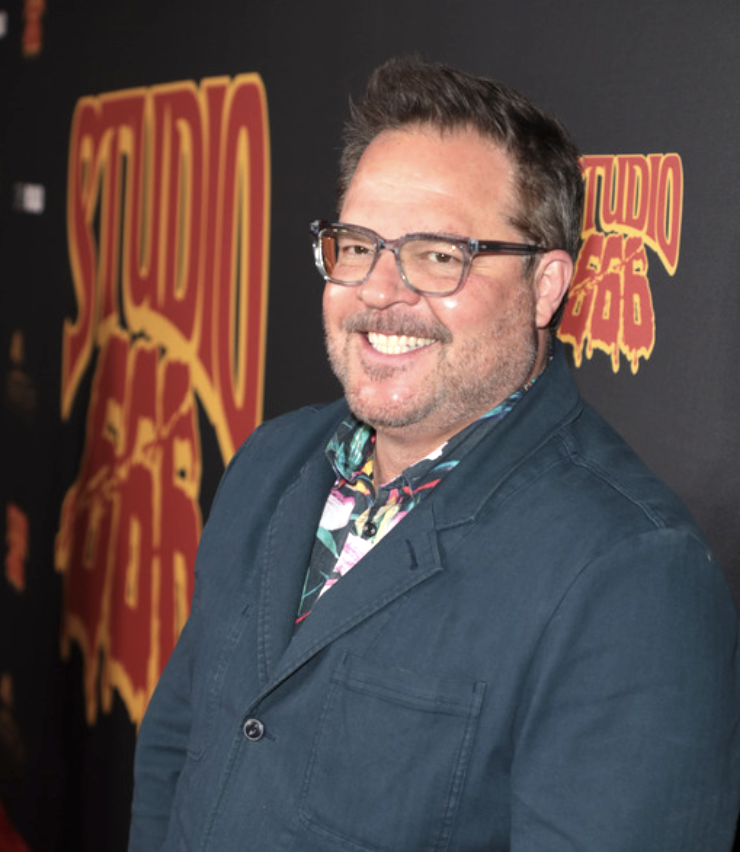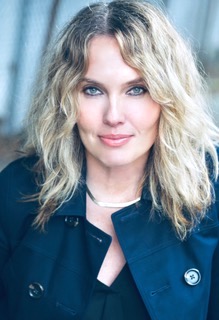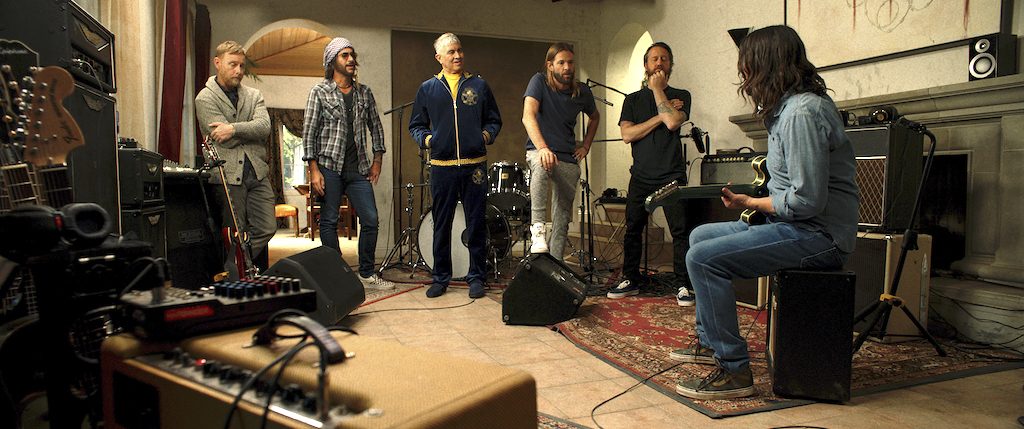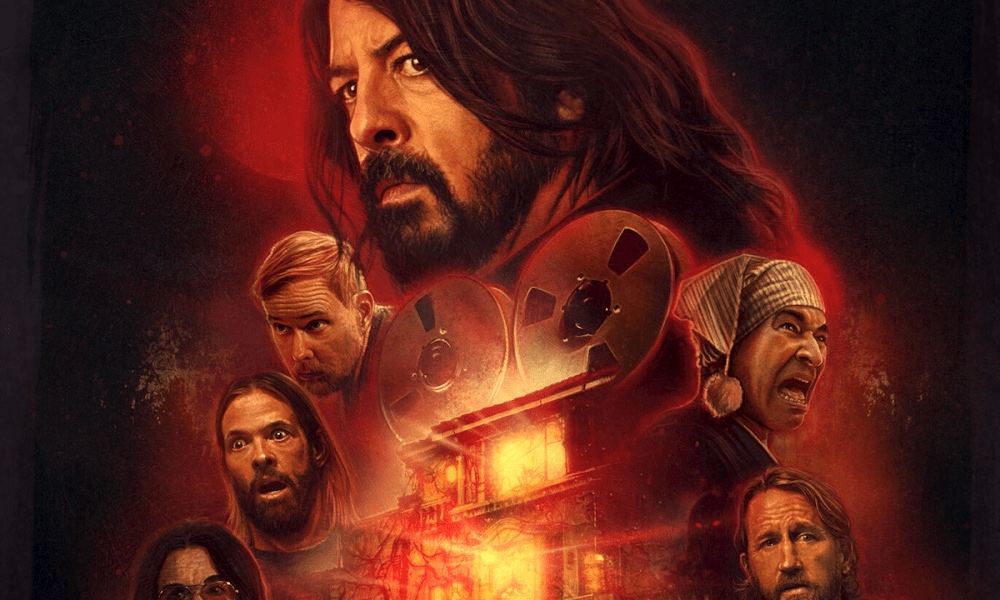Horror and comedy may go hand in hand, but adding rock and roll into the mix just makes it all that much better.
So, when longtime friends and unofficial collaborators Jeff Buhler (Pet Sematary) and Rebecca Hughes (Cracking Up) received the call to meet with Dave Grohl about adapting his short story for the big screen, they knew this would be a unique and rewarding experience.
Penned after Foo Fighters recorded their most recent album Medicine at Midnight at a haunted mansion in Encino, Studio 666 recreates the experience for band members Dave, Taylor, Pat, Nate, Chris and Rami, only this time with demonic possession taking over the recording process as Dave struggles with crippling writer’s block. It is truly a wild ride from start to finish. It’s gruesome, it’s hilarious, and above all, it’s fun, whether you’re there for the Foos or the horror or both. I spoke with Jeff and Rebecca about the experience, what it was like working on a screenplay with and for musicians and about the joys and challenges of writing campy.
Have you collaborated before or was this your first time working together?
Jeff: We have collaborated on many projects unofficially, because we have known each other for 20-something years; we both left our studio gigs at the same time to become writers, and have leaned on each other over the years in many different ways – notes, collaborations, co-writing… but this was the first project that that we got off the ground as a team. We were very fortunate that it was with such a cool team with Dave, Foo Fighters and everybody. It was a good fit.

Jeff Buhler
How did you both become involved with the project to begin with?
Jeff: Initially I got a call because of my experience with horror movies. I heard that the Foos were interested in doing something in that space and as we started talking more and more about what the project was, and that they wanted to replicate that self-deprecating ironic humor that they have in all of their music videos and they carry through their lives. I realized that bringing Rebecca into the project and us working together would be the perfect fit. Not only is she a comedy genius who has worked on a million comedy features and TV shows, but we both have a long history in the rock scene. I’ll let Rebecca tell you how she knows those guys personally, but it just seemed like really good chemistry – and it worked out well.
Rebecca: For me, it was a big coincidence, because I actually knew the band; I had gone on tour with them years ago as a guest of one of their opening bands Eagles of Death Metal. My good friend Samantha Maloney was the drummer at the time; she said “come on tour with us”, and I did. I don’t know what I was expecting, but it wasn’t that I would be able to hang out with Foo Fighters so much – I didn’t realize Dave would be so open and cool! So I got to know him pretty well on the road we hung out a little bit and he was very much like a lot of my friends, including Jeff. It was a very easy connection and I “got” him a little bit in terms of his humor.
So it was a very fortuitous event. I just thought it would be the end of the road, like I’d be in the old ladies’ home one day and they’d be saying “okay Rebecca we’ve heard about the time that you went on tour with Foo Fighters and Eagles of Death Metal, enough already.” I never thought it would come full circle to this other thing with Jeff then inviting me in on this project.
Jeff: And there was a moment when it came full circle for Dave too, because when we first went to meet with him, he was still recording up in the house that’s in the film. We walked in and Dave was sitting there and he’s like “wait, I know you and I know you”…and it was immediately just a conversation about all these cool ideas that he had, and he just started riffing and talking. There was never that moment that is such a bummer for writers, where you have to go and perform or pitch or get over that sort of studio resistance to an idea that you know is great. Everyone was all in from the moment that we started talking about it, and I think it was that energy that sold him on it being a good fit for them too.
Dave is always trying to do something new, something creative, something very fan-driven. Was he open to just working with you both, developing and changing his story as it needed to be changed?
Jeff: We let him talk first, because he had been thinking about this for a long time; working in that house and having conversations with people like Tony Gardner and his incredible team of producers, Jim Rota and John Ramsay, who’ve worked with him on countless documentaries and music videos. So they had already been cooking the idea and it then fell to us to come in there, absorb what they wanted to put out and then put it through the screenwriter machine to make it into a movie. Once we started arranging things, seeing stuff that maybe had to go or coming up with ideas that were riffing on what they said, then we started getting excited and ideas just started to flow.
Rebecca: It was about making his ideas work; he had a good idea, a solid idea and it was funny. We knew what he wanted to play and what was in his in his wheelhouse because it’s him on the big screen so it’s what he felt comfortable with. So you kind of read between the lines of “okay, this is what you want” and then we applied the craft the best we could.

Rebecca Hughes
Jeff: And then things came up during that process. Once you start writing, there’s ideas that land. We came back with so many at one point, they were like “okay enough!” We would have just kept going.
When you first read Dave’s story, what format was it in?
Jeff: Dave is very famous for being a member of the oral tradition of storytelling. Even with music! He always talks about the fact that he can’t read sheet music. He just feels things and he knows what goes where and what sounds right, so a lot of it was conversational. But he did have some written pages and it was like all of these ideas that had been spilled out. It wasn’t in traditional screenwriting form – there were no act breaks, we had to look for character arcs, and so on. We also had to look for ways to plug in the real life characters of the band, not just Dave, but all of the band members, in a way that supported the narrative and pushed things forward, allowing us to hit those screenwriting marks that make it feel like a movie. So that’s where the craft of it came in.
Rebecca: It was maybe like three pages, mainly of Dave sort of spewing out what he wanted it to be.
Jeff: What we would normally call brain vomit, but in the case of Dave Grohl, what we would call just a rush of genius ideas.
How closely did you write the band members’ on-screen characters to resemble their off-screen personalities?
Rebecca: When we started the script, we still hadn’t gone up to hang out with the band. When I went on tour with them back in the day, Rami and Pat were not in the band at that time. I got to know Nate and Taylor a little bit, and as I mentioned, Dave. When we went up to the house, I was a fly on the wall for about two hours and I just watched them in their natural habitat doing their rockstar stuff and interacting with each other. They’re not actors – I mean, they did great work acting, but their main jobs are musicians. So what I would say we were going for was a sort of exaggerated authenticity. We definitely tried to stick as close to them as possible, and as close to their dynamics as possible. The whole thing just kind of snowballed in a very organic way and we just sort of riffed off of who they really are.
Jeff: We also had a nice lunch with Nate where he filled us in on some of the inner dynamics. That was helpful, because when you’re observing people, they kind of show you what they want you to see and then Nate would fill us in on things like a real-life barbecue competition between Chris and Dave (which was worked into the story).
Rebecca: There are a lot of Easter eggs.
Jeff: We just pulled stuff that we observed in their world and then found places to allow it to propel the narrative or speak to the story arc. Everybody was super enthusiastic and threw themselves into it, so it was nice that people were receptive to what we were giving back to the band. Rami sort of took this caricature of himself and then pushed it to these ironic self-deprecating extremes that are really funny onscreen. And Dave obviously killed the role, no pun intended. He was really good.
Is this a movie strictly for Foo Fighters fans? Or did you write it to appeal to all horror fans?
Jeff: We tried to hit the Venn diagram of all that. It’s tough because there’s stuff that’s very specifically Foo Fighters in there, but they’re well known enough that everybody knows who they are, whether you’re a fan or not. It was designed to work for fans on one level, for the casual fan of rock and roll and music and the music scene on another level, and then for horror fans on another level entirely. Kind of like a Warner Bros cartoon where it’s all just stacked together.
What are some of the challenges you encounter as a writer when mixing horror and comedy? What do you enjoy about it?
Rebecca: It’s just the exercise of it, which I wouldn’t say is really a challenge. For example, we got the note that the script was too funny and we had to beef up the horror… and we weren’t entirely done, that was just the first draft. So I guess it is striking that balance – once you’re going along on the whole comedy side and getting all the characters dialed in, you have to remember to then make things really creepy and to honor the horror element of it. And vice versa, knowing not to take it too seriously. So it really is, I would say, striking that balance – which really just comes out in drafts. You have to churn through the drafts and then get that balance.

Foo Fighters on the set of Studio 666
Jeff: I’ve worked on a number of horror movies where logic and mythology are paramount and you have to really adhere to strict rules that are well defined. And when you’re telling something in the tone of horror comedy, everybody just accepts that there’s going to be a book with the answers in it; you don’t have to explain too much, you just grab it and start reading. Rebecca’s heard me complaining so many times about “the rules”! So I found that liberating as a horror writer, to be able to not focus so much on the logistics of the spell and just be like “let’s make it as nuts as we can”. So that was really fun.
The other thing I would say, just from a craft standpoint, is that I feel like horror and comedy are, in many ways, connected – they’re like two sides of the same coin, in the sense that they’re both very dependent on timing and atmosphere and reaction shots. It’s not just the line of dialogue – it’s the way it’s delivered, the way it hangs. And the editing is different. Being able to flip from one to the other and keep that same rhythm going is pretty much the trick. It’s been done well in films like Shaun of the Dead and Evil Dead II. Shaun of the Dead leaned on the funny side and Evil Dead II leaned on the horror side, but you really could flip back and forth, and still be scared while you were laughing or still be laughing while you were scared. It’s a very fine line.
Rebecca: To add to that, it’s important to make sure your creative team is aligned in terms of how much horror and how much comedy there is, so that everybody’s on the same page – literally and figuratively.
If you’ve learned one thing – either through this project or the course of your career – that you would want to highlight, what would it be?
Rebecca: Mine is to keep writing. People will say to me “oh, I’m not a writer, I’m just writing this thing…” If you’re sitting down to write, you’re a writer. If that’s what you’re compelled to do, then you owe it to the universe to show everybody what you have to say, because it’s probably something really cool. Even if you’re not earning money at it, or you are earning money at it and you just got noted to death and told you’re a piece of crap and you hate yourself and you hate your script…I’ve been through all of that. Keep fighting, keep doing it…until the minute you don’t want to do it anymore.
Jeff: Don’t give up – that’s a piece of advice that I give to people. Not just writers, but people who approach me and ask for tips on how to break into the business. If you have a plan B, go do the plan B right now. If your only plan is to somehow make movies and tell stories, then it doesn’t matter – you just do it, there’s no other choice but to keep at it.
More specifically on the writing front, I would say to allow yourself to fail. Don’t be discouraged when you write something that really does suck or doesn’t work, because we all do. I must have written 10 bad scripts before one that was even medium good. You just have to allow that, and you have to give yourself the permission to fail and learn from it. And then get back up on the horse. I’m still learning about the craft; light bulbs go off with every new project where I think “Oh, this is how that works, now I understand it” It’s not like all of a sudden one day you know how to write and that’s it – it’s an ongoing process and you just have to accept that you’re in it and you have to stick with it.
Rebecca: And continue to work on your craft – consider screenwriting almost like a yoga practice or any sort of practice. Continue to hone your chops, take the webinar, pick up the book and read.
Jeff: Once you’ve really got your head around structure and format and you’ve built a voice for yourself, don’t be afraid to put yourself into it. Sometimes a big rookie mistake is to think “I’m going to go break the rules of screenwriting on my first screenplay. Let’s throw timelines out the window and do multiple narratives” and so on. No – write the one that hits all the buttons where it needs to hit. But within that format, don’t feel shackled. Really put yourself and your voice into it and that’s what’s going to make it stand out as your screenplay and as something that came from you. That’s a huge thing, where people start recognizing your work as having sort of a brand or a feel to it. And that’s very important to break through the chaos and the other 10,000 scripts that are coming in every minute.

